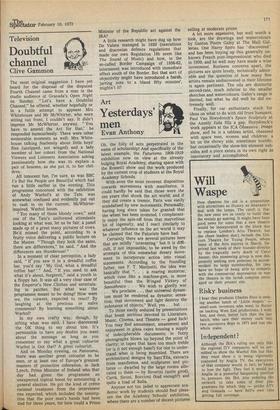Television
Doubtful channel
Clive Gammon
The most original suggestion I have yet heard for the disposal of the disputed Fourth Channel came from a man in the studio audience of Granada's Open Night on Sunday. "Let's have a Doubtful Channel," he offered, whether hopefully or in a futile attempt to appease Mrs Whitehouse and Mr McWhirter, who were sitting out front, I couldn't say. It didn't impress Mr McWhirter, anyway. "You have to amend the Act for that,' he responded humourlessly. There were other memorable moments as well: Mrs Whitehouse talking fearlessly about little boys' flies (unzipped, not winged) and a lady member of her cohort from the National Viewers and Listeners Association asking passionately how she was to explain a pair of bosoms, as she put it, to her children.
All innocent fun, I'm sure, as was BBC l's But the People are Beautiful which had run a little earlier in the evening. This programme concerned with the exhibition of Andy Warhol's at the Tate, was somewhat confused and evidently put out to cash in on the current, McWhirterinspired, Warhol boom.
"Too many of those bloody cows," said one of the Tate's uniformed attendants looking at what was, let us be fair, a panel made up of a great many pictures of cows. He'd missed the point, according to a fruity voice delivering a public lecture on the Master. "Though they look the same, there are differences," he said. "And the differences are thunderous!"
In a moment of clear perception, a lady said, " Ir you saw it in a dreadful coffee bar, you'd say 'My God, what a dreadful coffee bar! ' " And, "If you need to ask what it's about, forgerrit," said a youth in a floppy hat. It was all a very clear case ot the Emperor's New Clothes and entertaining in patches. But what was the programme meant to be doing? How were we, the viewers, expected to react? By laughing at the precious or naive comments? By learning something about Warhol?
In my own crafty way, though, by sifting what was said, I have discovered the OK thing to say about him. It's permissible to have any doubts you want about the message as long as you remember to say what a great colourist Warhol is. Got that? A great colourist.
And on Monday eyening, on Panorama, there was another great colourist to be seen, or at least one of Europe's greatest masters of protective coloration, in Jack Lynch, Prime Minister of Ireland who that day had given the programme an unexpected topical boost by announcing a general election. He got the kind of creme caramel treatment from the interviewer one expected, which included the assumption that the poor man's hands had been tied for three years, for how could a Prime Minister of the Republic act against the IRA?
A little research might have dug up how De Valera managed in 1939 (executions and draconian defence regulations that made our own Regulation 18b seem like The Sound of Music) and how, in the so-called Border Campaign of 1956-62, internment was introduced with immediate effect south of the Border. But that sort of objectivity might have introduced a harsh, jarring note to a bland fifty minutes', mightn't it?


































 Previous page
Previous page